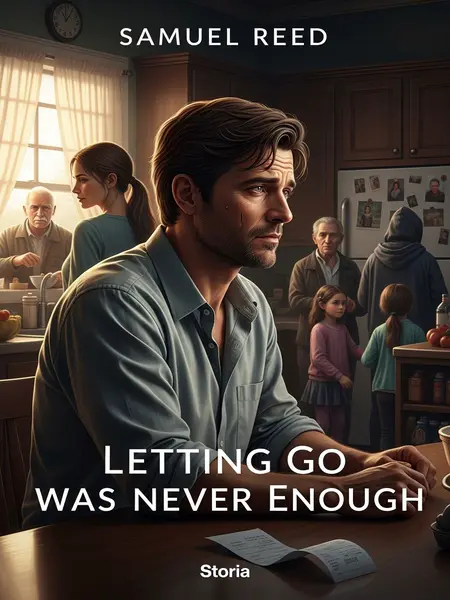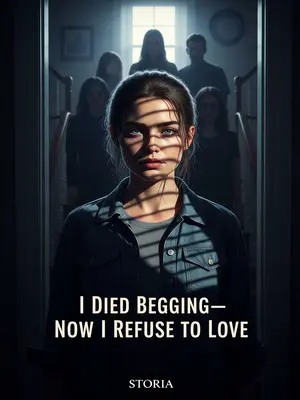Chapter 3: Debts That Can’t Be Repaid
But in just ten days, Lillian would be back.
I marked the calendar, counting down with dread and hope tangled together. Ten days—too short, too long. Standing at the edge, waiting to jump.
She’d tell me, as always, that I needed to be understanding, as the oldest.
She’d say it with that practiced sigh, that look that said she expected me to be the rock, the one who never complained. I’d heard it so many times, it echoed even when she wasn’t there.
My younger sister had worked herself sick to put Lillian through school. That’s why she died so young.
It was a story Lillian never stopped telling, like it explained everything. My sister gave up her health, her future, so Lillian could have a shot. The guilt never left, always hanging in the background.
Lillian wore that debt like a badge.
She was always reminding herself—and me—that she could never repay it. So she tried, over and over, by giving everything to Mark and his kids, even if it meant leaving us with nothing.
She’d look at me and say I was reliable, that she could depend on me. But Mark—no college degree, raising two kids—would have a hard time alone, so she wanted to take him along to work.
She’d fix me with those pleading eyes, telling me I was strong, that I could handle anything. Mark, though? Fragile, lost, in need of help. I wanted to scream—why was it always my job to be the strong one?
At the time, I just sat there, stunned. Couldn’t make sense of any of it.
I remember gripping the letter at the kitchen table, the words blurring as I tried to process it all. It felt like the ground had shifted under my feet. I wanted to ask why, but the words stuck in my throat.
But after years of marriage, Lillian had already gaslit me until I felt like a fool.
She was a master at making me question myself, at twisting every argument until I was the one apologizing. I started to believe maybe I really was the problem, that wanting something for myself was selfish.
A husband’s job was to unconditionally tolerate and understand his wife—or so I’d always been told.
Heard it from my father, from the preacher, from every old-timer in town. A good man keeps the peace, puts his family first, swallows his pride for the sake of harmony. I tried to live up to that, even when it broke me. Was that really what being a man was supposed to mean?
So I swallowed my resentment and humiliation, and watched as Lillian and Mark became inseparable.
They shared inside jokes, finished each other’s sentences, made plans without me. I told myself it was just family, just helping out, but deep down I knew better. Every time I saw them together, something inside me chipped away.
I gave up my plan to go out West.
I packed away the maps, the brochures, the dreams scribbled in the margins of my notebooks. I told my professor I couldn’t make it, that family came first. She sounded disappointed, but she understood—or at least, she said she did.
At first, Lillian still mailed grocery vouchers and money home.
For a while, there were envelopes in the mailbox—small comforts that made the struggle bearable. I’d buy extra bread, a little meat, sometimes a treat for the kids. It wasn’t much, but it helped. I clung to those scraps.
And then—nothing.
The mailbox stayed empty, the cupboards got barer, and I learned to make do with less. I started skipping meals so the kids could eat, patching clothes until they fell apart.
It was only much later I learned that after Mark went with her
she worried he’d feel like an outsider and be too polite to spend money
so she handed him all the money and vouchers every month
and even put him in charge of mailing anything home.
I couldn’t believe it at first. The idea that she’d trust him with everything, while I struggled to keep the lights on, made my blood boil. But by then, it was too late to change anything.
At first, Mark still sent some back, but later he just kept everything for himself.
He’d show up with new shoes for his kids, fresh groceries, while mine went without. I tried to tell myself he needed it more, that it was just temporary, but the bitterness only grew. Did he ever think about my kids at all?
Years later, when people tried to hold him accountable, Lillian just brushed it off with, “Didn’t I mail the money?”
She said it like that settled everything, like mailing the money meant her job was done. Folks would nod, shrug, and move on. No one wanted to get in the middle of family business.
By then, Mark’s two kids were already grown and had good jobs.
They had degrees, careers, families of their own. Postcards from cities I’d never see, new appliances, retirement plans like it was just another vacation.
My son couldn’t even get a steady position; my daughter, frail from years of poor nutrition, dropped out early and married young.
She left home before she was ready, chasing a chance at something better. My son bounced from job to job, always one paycheck away from disaster. I tried to help, but there was only so much I could do. The guilt was a constant ache.
My children lived in poverty all their lives.
That truth sits heavy on my chest. They learned to go without, to make do, to expect little and be grateful for scraps. I saw the toll it took—the way my daughter’s shoulders hunched, the way my son wouldn’t meet my eyes. I’ll never forget it.
But after they retired, Mark’s kids pulled in hefty pensions, and the whole family lived large.
They bought boats, vacation homes, sent their kids to college without a second thought. Big parties, the whole neighborhood invited. Never once mentioning how they got there.
My kids blamed me for being useless. Still, they ran to cozy up to Mark’s family.
They laughed at Mark’s jokes, asked him for advice, treated him like the father they wished they’d had. It stung, but I understood. Everyone wants to feel close to success, to belong somewhere. I was just the reminder of everything they’d lost.
Till the day I died, not one of them spared me a glance.
My last days were quiet, the house empty but for the hum of the fridge. I’d sit on the porch, watching the world go by, wondering if anyone would notice when I was gone.
No one knew. Not yet. I’d been given a second chance.
I kept that secret close, like an ace up my sleeve. This time, I’d play my cards differently. This time, I’d fight for myself.
In my previous life, right after I got the certified letter, Lillian came back.
She swept in with her usual energy, talking a mile a minute about her trip, about Mark’s troubles, about everything except what mattered to me. I tried to get a word in, but she was already making plans for everyone but us.
She said she wanted to take Mark with her to work, and I should be understanding and supportive.
She made it sound like a small favor, like I was unreasonable for hesitating. Her words were smooth, practiced, the kind that left no room for argument.
From then on, I was left to care for both kids and both sets of parents.
It was more than any one person should be asked to handle. But I did it anyway. Juggled schedules, appointments, meals, all while working odd jobs to keep the lights on. No one ever said thank you. Not once.
I politely turned down my professor’s invitation.
That was the hardest letter I ever wrote. I told her I was grateful, that maybe next year would be better. I knew it was a lie, but it was easier than explaining the truth.
That was the biggest regret of my life.
It haunted me. Every time things got hard, I’d think about what might have been, about the life I could’ve had if I’d just been brave enough to say yes.
I rubbed the invitation in my hand.
The paper was soft from all the times I’d unfolded it, read it, tucked it away again. I traced the words with my thumb, letting myself dream for just a moment.
Then I quickly packed up my things.













